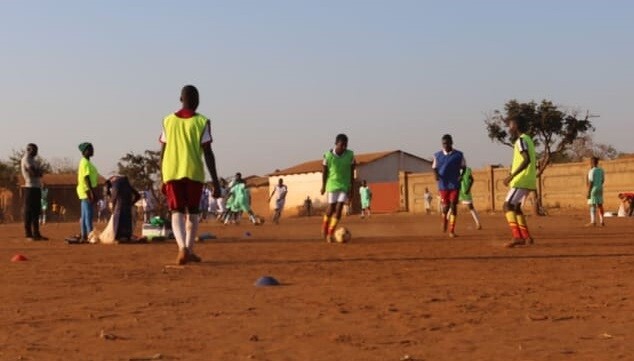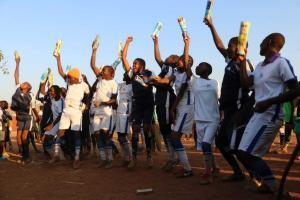
Stella Nkhoma aged 15 died after taking herbs to abort a three month pregnancy. She had taken the herbs on instruction from her 18-year-old boyfriend – to protect of his education.
In another case, Chifundo Mkwanda, 15, decided to tell her boyfriend Joshua Mbewe that she was pregnant.

Upon hearing the news, Joshua showed no sign of responsibility. Instead, he threatened to beat up Chifundo if she revealed the pregnancy was his.
That is when she regretted ever having the relationship.
Thinking of these scenarios, one is convinced that adolescents need to be taught that sex must be done out of love and when time is ripe – and only when the two are in marriage.
At least, that is the reasoning of British Council in Malawi which is implementing a Sports for Development Initiative in Mtandire in Mtandire, Lilongwe – Malawi’s capital city under the name Our Shared Goal (OSG).
McDonald Nyoni, Project Manager said: “The youth in Mtandire will be beneficiaries of this concept if they abide by British Council in Malawi’s counsel in their several projects targeting people of ages 7-20 years of old.”
He added: “Our Shared Goal (OSG) is an initiative by the British Council, with football being used as a tool to combat gender based, violence and issues circling gender equality and gender equity.”
Mtandire is a hotbed for gender based violence, women not having access to education and the lack of adult female role models for young girls has fostered huge unemployment in the community. This provides a ground for dependency adding to a vicious circle of the prevailing issues thus creating poverty, and increased HIV/AIDS infections in the process.
Role of partners in the project
Tingathe youth organisation and Zikomo Foundation – partners of British Council in the project – have sampled this initiative and they feel by working with British Council they will greatly assist to have messages of fight against problems faced by youth and related issues.
Tingathe Organisation and Zikomo Foundation play role of life skills, gender based violence and safeguarding trainings. While Play Football Malawi is engaged into football trainings and adding to this order, Mhub – technology centre is partnered for digital content sharing.
Again, Our Shared Goal is working with Edu-Sport Foundation for capacity building of local coaches and Centre for the Study of Violence and Reconciliation who are from Zambia and South Africa respectively.
“Among others, the adolescent and youth are engaged into inter-gender related activities where sports is used as a tool for development. Topics that are hard to talk about in Mtandire, such as gender based violence, early child marriages and child abuse, are challenged and discussed openly during the soccer training,” explained McDonald.
The project, Our Shared Goal, is being funded by Comic Relief with a tune of £150,000. Through combined football training with social, relationship and sexual health education, delivery by coach-educators, the project is to run for a period of over 3 years – until 2021. And is aimed to engage 1,170 young people of which 60 percent will represent females.
Our Shared Goal use cohorts by young participants recruited from Mtandire community who are engaged in weekly sessions of over 10 weeks period, which is followed by a community festival at Bingu National Stadium.
The organisation has prioritised engagement and harnessed the support of key stakeholders in Mtandire community including parents, area chiefs, community members and partners.
Furthermore, more than 250 young people have developed inter-gender relationships skills using sports where 58 percent are boys and 42 percent are girls.
“A highlight of 2016 was the Our Shared Goal community festival, attracting an audience of more than 4,800 people of which 2292 were boys against 563 girls, men making it 1550 against background of 494 women,” Nyoni said.
The project looks forward to the transformation of Mtandire and to the creation of a new generation which talks about gender based violence and early child marriages where they are able to protect themselves and their peers from the victimization of these failures of the community.
“Our focus is on the minors as they are at an early age where they learn and adapt rapidly. With a lack of adult role models, they are not only the ones most vulnerable to be led astray but also the ones who can adapt to these changes. They can help bring about a change by initially changing their attitudes and perceptions towards these issues,” lamented Nyoni.
It is the expectation of the project by the end of 2021 to have transformed the youth by making them economically empowered.














